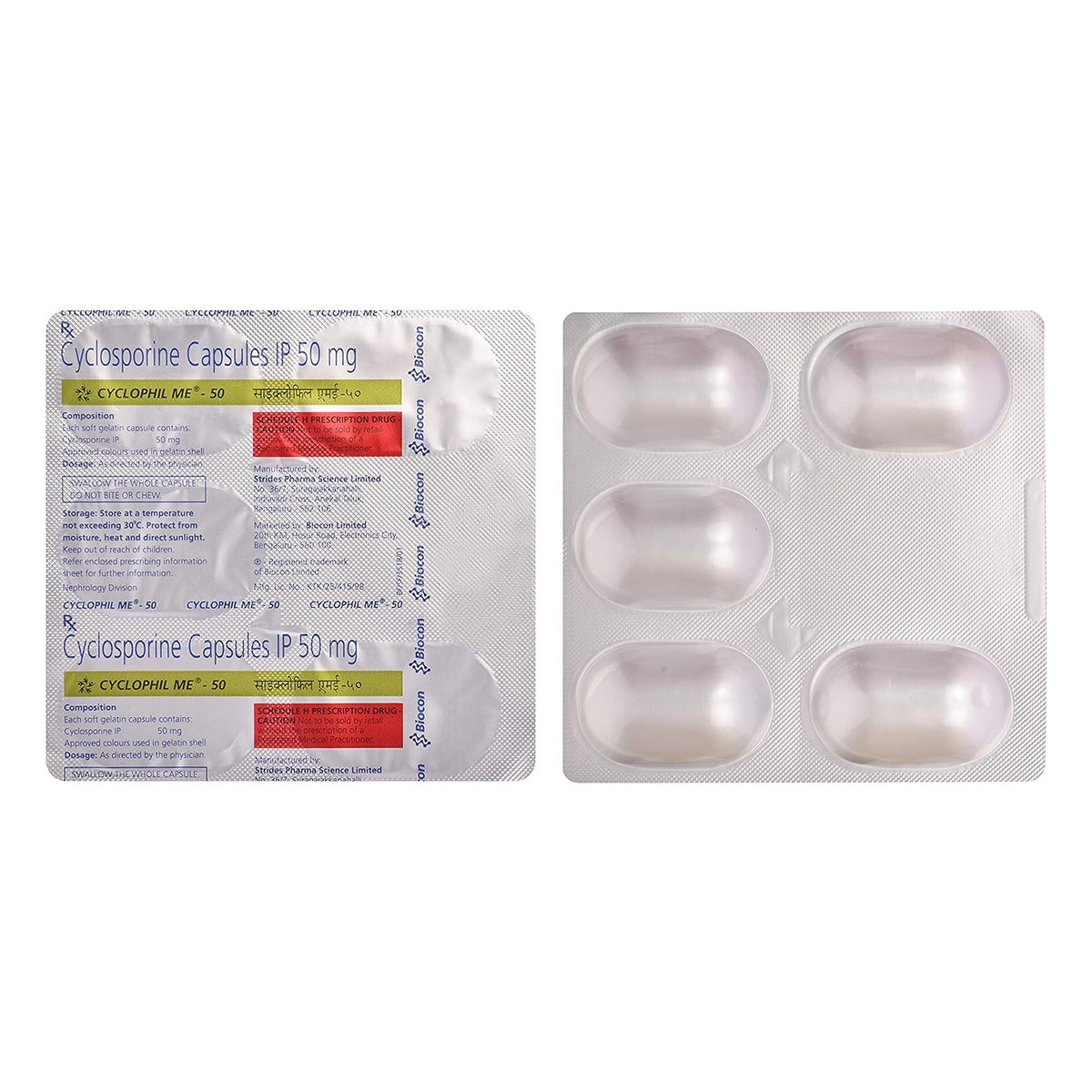Cyclosporine
About Cyclosporine
Cyclosporine belongs to a group of medications called 'immunosuppressants,' primarily used to prevent organ rejection after a transplant. It is also used to treat symptoms associated with psoriasis and rheumatoid arthritis.
Cyclosporine contains 'cyclosporine,' which works by suppressing the immune system, thereby stopping your body from rejecting a new organ. It also reduces rapid skin cell growth and lowers pain and inflammation in the joints.
Cyclosporine may cause side effects like headaches, vomiting, nausea, loss of appetite and diarrhoea. Most of these side effects do not require medical attention and resolve over time. However, consult your doctor if the side effects persist or worsen.
To treat your condition effectually, continue taking Cyclosporine for as long as your doctor has prescribed. Inform your doctor about your health condition and any medications you are taking to help rule out any potential/unpleasant side effects.
Uses of Cyclosporine
Treatment of Psoriasis: Cyclosporine is used in the treatment of psoriasis. It helps reduce rapid skin cell growth and inflammation caused by psoriasis.
Treatment of Rheumatoid Arthritis: Cyclosporine is used in the treatment of rheumatoid arthritis. It helps reduce pain and inflammation in the joints and slows down joint damage.
Medicinal Benefits
- Cyclosporine suppresses the immune system to prevent the rejection of transplanted organs (e.g., kidney, liver, heart).
- It is also used in bone marrow and stem cell transplantation to prevent graft rejection.
- Cyclosporine helps control immune overactivity in various autoimmune conditions by blocking immune cells that attack the body’s own tissues.
- It reduces rapid skin cell growth and inflammation in severe psoriasis, leading to clearer skin and symptom relief.
- This medicine reduces joint pain, inflammation, and slows down joint damage in patients with active rheumatoid arthritis unresponsive to other therapies.
- It may also be used to treat severe atopic dermatitis, especially in patients who do not respond adequately to topical treatments.
- Helps manage severe inflammatory eye diseases that can threaten vision by reducing immune-mediated damage.
- It is used in certain cases of nephrotic syndrome (a kidney disorder causing excess protein loss in urine), especially when other treatments fail.
Directions for Use
- Cyclosporine can be taken with or without food as advised by your doctor.
- Follow your doctor's instructions on the dosage and timing of this medication to ensure safety.
- Check the label for directions and use as advised by your doctor.
- Measure the prescribed dose of Cyclosporine using the dosing syringe. Mix it with apple or orange juice, stir well, and drink immediately.
- Do not store the prepared mixture for later use.
Storage
Side Effects of Cyclosporine
- Headache
- Vomiting
- Nausea
- High blood pressure
- Loss of appetite
- Diarrhoea
Drug Warnings
- Do not take Cyclosporine if you are allergic to any of the components.
- Let your doctor know before using Cyclosporine if you have/had liver or kidney problems, epilepsy, high blood pressure, low levels of magnesium, high levels of potassium, cancer, or infection.
- Cyclosporine may make you more susceptible to infections; consult your doctor if you develop any signs of severe conditions such as fever, sore throat, breathlessness, jaundice, unexplained bleeding, or bruising.
- Before taking Cyclosporine, inform your doctor if you have any type of cancer.
- Consult your doctor before taking Cyclosporine if you are pregnant or planning for pregnancy.
- Cyclosporine should not be taken by breastfeeding mothers as it passes into breast milk.
- Inform your doctor about your health condition and medicines to rule out any unpleasant side effects.
Drug Interactions
Drug-Drug Interaction: Cyclosporine may interact with other immunosuppressant medicines (tacrolimus), anti-gout (thiopurine), water pills/diuretics (amiloride, spironolactone), blood pressure-lowering pills (aliskiren), cholesterol-lowering pills (atorvastatin, pitavastatin, simvastatin), antibiotics (such as erythromycin or azithromycin), antifungals (voriconazole, itraconazole), medicines used for heart problems or high blood pressure (diltiazem, verapamil, amiodarone), used to treat menstrual problems (danazol), medicines used to treat gout (allopurinol), used to treat hepatitis C (colchicine, telaprevir).
Drug-Food Interaction: Avoid grapefruit or grapefruit juice while taking Cyclosporine.
Drug-Disease Interaction: Inform your doctor if you have any pre-existing medical conditions such as high blood pressure, liver disease, or kidney disease.
Drug-Drug Interactions Checker List:
Safety Advice

Alcohol
cautionYou are recommended to avoid alcohol consumption while taking Cyclosporine. It could lead to increased dizziness.

Pregnancy
cautionCyclosporine belongs to pregnancy category C. Consult your doctor before taking Cyclosporine if you are pregnant or planning for pregnancy.

Breast Feeding
unsafeCyclosporine passes into breast milk. Avoid breastfeeding while taking Cyclosporine.

Driving
cautionCyclosporine may cause dizziness. Drive or operate machinery only if you are alert.

Liver
cautionDose adjustment may be needed. Please consult your doctor if you have a liver impairment or any concerns regarding this.

Kidney
cautionDose adjustment may be needed. Please consult your doctor if you have kidney impairment or any concerns regarding this.

Children
unsafeCyclosporine is not recommended for children as efficacy and safety have not been established.
Habit Forming
Diet & Lifestyle Advise
- Eat foods rich in quercetin (a flavonoid) such as apples, cherries, broccoli, spinach, and blueberries.
- Consuming food rich in probiotics helps in developing the immune system against allergies.
- Limit intake of food that might trigger allergies, such as dairy products, soy, eggs, and nuts.
- Avoid consumption of foods with excess sugar to prevent flare-up inflammation.
- Include fruits, vegetables, whole grains, healthy fats and fish in your diet.
- Reducing stress and maintaining a regular sleep pattern would be helpful.
- Avoid getting in contact with harsh soaps, detergents, and rough fabrics.
Special Advise
- Cyclosporine suppresses the immune system and raises the risk of cancer, particularly of the skin and lymphoid system. Therefore, limit your exposure to sunlight and UV light by wearing appropriate protective clothing and applying a sunscreen with a high protection factor.
- Regular monitoring of liver and kidney functioning, blood pressure, and lipid levels is advised.
Patients Concern
Disease/Condition Glossary
Organ transplant rejection: When you get a new organ transplanted to your body, your body recognises it as a foreign element, tries to attack and reject it because it is not originally part of your body. So, immunosuppressant drugs like cyclosporine are given to such patients to suppress the immune system, thereby preventing an attack on a newly transplanted organ.
Rheumatoid arthritis: It is an autoimmune disease (the body's immune system attacks its tissue) that leads to joint pain and damage. Symptoms of rheumatoid arthritis include pain, inflammation of joints, difficulty moving, and swelling.
Psoriasis: It is an inflammatory skin illness. It is not infectious but tends to run in families. It causes itchy and red patches on the skin.
FAQs
Cyclosporine is used to prevent organ rejection after a transplant. Also, it helps to reduce the pain/inflammation in rheumatoid arthritis conditions and in the treatment of psoriasis.
Cyclosporine acts as an immunosuppressant, which helps in reducing inflammation and preventing joint stiffness, thereby providing relief from rheumatoid arthritis.
If you miss a dose of Cyclosporine, take the missed dose as soon as you remember it. However, if it is almost time for the next dose, skip the missed dose and take the scheduled dose instead.
Diarrhoea might be a side effect of Cyclosporine. Drink lots of fluids and eat non-spicy food if you experience diarrhoea. If you find blood in stools (tarry stools) or if you experience severe diarrhoea, consult your doctor. Do not take anti-diarrheal medicine on your own.
Yes, the use of Cyclosporine may cause abnormal facial and body hair growth as a common side effect. Please consult your doctor if you have any concerns.
Cyclosporine is known to suppress the immune system. As a result, it increases the risk of infections and developing cancers, especially of the skin. Therefore, avoid prolonged exposure to sunlight by wearing suitable protective clothing and using sunscreen regularly.
Cyclosporine may cause high blood pressure. Therefore, consult the doctor before taking Cyclosporine if you have high blood pressure.
No, Cyclosporine is not a steroid. It is an immunosuppressant.
Cyclosporine may cause weight gain. Follow a healthy diet and exercise regularly to maintain proper weight. Consult your doctor if you have any concerns.
Cyclosporine may cause fatigue. Eat a healthy diet, get regular exercise, manage stress, improve sleep habits, and quit smoking. Doing these may help cope with fatigue.
Yes, your doctor will recommend certain tests to check your body’s response to Cyclosporine.
Cyclosporine may cause side effects like headache, vomiting nausea, high blood pressure, loss of appetite (feeling unwell and upset stomach), and diarrhoea. Talk to your doctor if you experience these side effects persistently.
Use the measuring cup/dosing syringe provided with the pack to measure the prescribed dose of Cyclosporine. Mix the solution/suspension in a glass of milk or orange juice, stir well, and consume immediately. Do not store the prepared mixture for later use.
You are advised to take Cyclosporine for the duration prescribed by the doctor. The duration of treatment will depend upon your condition and response to the treatment.





